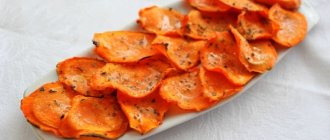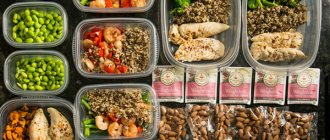Not eating carbohydrates in the evening (or not eating at all in the evening), because everything eaten will not have time to be spent on energy and will go into fat - this is still one of the most popular weight loss myths.
On the one hand, metabolism in the first half of the night (the first half of your sleep) actually decreases by 35% (). But in the second half it grows noticeably. Because of these ups and downs of metabolism, the average energy expenditure during sleep is not much different from the daytime rest ().
What Science Says
A recent study conducted at the Hebrew University of Jerusalem and published in the journal Obesity examined the issue of evening carbohydrates.
The participants were divided into two groups - control and experimental. Both groups were put on the same calorie deficit for six months with the same amounts of protein, carbohydrates and fat. One group ate carbohydrates throughout the day, and the second group ate 80% of all carbohydrates at dinner. The results showed greater weight loss, abdominal circumference and reduction in body fat mass, greater satiety and less hunger in the second group.
Of course, even though this group lost more fat and had better markers of health at the end of the study (better insulin sensitivity, increased good cholesterol, and decreased bad cholesterol), it is too early to say that this is exactly what you need to eat to lose weight quickly. . More research is needed. But one thing we can take away from it for sure: carbohydrates for dinner by themselves do not make a person fatter, bypassing the daily calorie requirement.
Myths about carbohydrates
Carbs make you fat
Of course, it is easier to blame some product for all sins than to take a comprehensive approach to planning your diet. The fact is that carbohydrate-containing foods are delicious and many cannot resist adding more. Only this will not be an additional portion of vegetables and fruits, but another bag of chips or a pack of cookies.
People get fat not from carbohydrates, but from overeating.
Include more unprocessed natural foods in your diet and control your intake of refined sugar. Remember: if you consume more calories than your body needs (even if they come from protein or fat), your weight will increase.
Fast carbohydrates may not be healthy
Carbohydrates are simple (fast) and complex (slow). It is believed that the former are very bad, and the latter are very good. And this point is worth dwelling on in more detail.
All carbohydrates are made up of structural units called saccharides. The more of them, the more complex the carbohydrate. Simple carbohydrates are made up of one (monosaccharides) or two (disaccharides) of these units. Complex ones consist of three or more units. Our intestines are capable of absorbing only monosaccharides. The job of the rest of the gastrointestinal tract is to break down the carbohydrate into its simplest form.
Thus, a simple carbohydrate does not need to be broken down, because it enters the body already prepared. And therefore it immediately enters the blood, sharply increasing insulin levels. It is quickly digested and does not give a feeling of fullness, which is why it is considered fast. Complex carbohydrates require processing, so sugar enters the blood gradually, and we get a long-lasting feeling of satiety.
Fast carbohydrates are sugar, honey, dairy products, fruits, processed grains, polished cereals. Complex carbohydrates are vegetables, greens, legumes, cereals, and whole grains.
But does this mean that now you need to eat only slow carbohydrates? Of course not!
It's all about the fiber. Fiber is the coarse fiber found in all unprocessed plant foods. It is not absorbed in the gastrointestinal tract, thereby slowing down the process of sugar absorption and its entry into the blood. Eating fiber-rich carbohydrates will keep you full for a long time and won't add unwanted pounds.
Fast carbohydrates with fiber are not harmful, eat them without fear. But without it, be careful! Choose a juicy pear over a bun, and instead of white polished rice, cook brown or wild rice.
If you want to be in shape, forget about bread and pasta
Sounds plausible, especially if you listen to ardent fans of no-carb diets like Dukan or Atkins. Especially when they mention the magic word “ketosis.”
Ketosis is a state when, in the absence of carbohydrates, the body begins to break down fats for energy. Sounds tempting? No matter how it is.
With the breakdown of fats, a large number of ketone bodies are formed. If carbohydrates are not in the diet for a short time, then these bodies do not pose a danger to humans. But in the case of prolonged carbohydrate starvation, the concentration of ketone bodies in the blood increases sharply. And this causes poisoning, up to ketoacidotic coma and death.
If you're not worried about health problems and only care about appearance, remember: in ketosis, your body will smell like acetone, like nail polish remover.
Yes, low-carb diets will give you the effect of rapid weight loss, but they can also be harmful to your health. And the research Science Confirms It: Carbs DON'T Make You Fat confirmed long ago: you lose weight equally on a diet with a normal carbohydrate content and with their restriction. The main thing is to consume any food in moderation.
What is the problem?
A no-carb diet after X number of hours sounds good in theory, but doesn't work well in the real world.
Disruptions
If you move most of your food to the first half of the day, it will be difficult to fight evening hunger. And it will definitely come, because it is impossible to eat enough once and for the whole day, no matter how much you eat.
Social isolation
Eating in the evening is part of the culture of our society. And living in a world where you can't go out to dinner with friends or at home with your family is hard. This is one of the reasons why so many people hate diets.
Unnecessary complication
Consistency and patience are two of the most important aspects of dieting that few people discuss. Instead, we're concerned with carb timing, macronutrient ratios on the plate, glycemic index, insulin index, and other things.
Rules help organize nutrition, but unnecessary unreasonable restrictions make the diet less compatible with life. With more freedom in choosing how and when you eat, you're more likely to stay on your diet longer.
The “no food after X hours” diet may not suit everyone, because everyone has their own lifestyle, daily routine and activity level. Choosing the frequency of meals and the distribution of foods throughout the day should be realistic and convenient for you.
Workouts and carbs in the evening
A separate question: should you eat after an evening workout if you want to lose weight? Or should you go to bed hungry so that your body burns more fat?
Here you can read in detail about the importance of nutrition around training.
Carbohydrates are energy. If you train in the evenings, then shifting carbohydrates to the evening makes direct sense: by consuming them before training, you provide yourself with energy for high-quality work. By consuming them after training, you speed up the body's recovery.
Insulin sensitivity is high after exercise (), so there is no need to worry about everything you eat turning into fat. Moreover, this is impossible on a calorie deficit.
Choice of carbohydrates depending on the time of consumption
The type and amount of carbohydrates consumed have a huge impact on the body's performance and ability to recover. If you choose the wrong carbohydrates or consume too many of them, you will soon find yourself inevitably gaining weight and lacking energy during your workouts.
3-4 hours before training
Some people find it easier to eat a few hours before a workout rather than right before it. If you train in the afternoon or evening and a large lunch is your main pre-workout meal, then this section is just for you.
Eating well before your workout allows you to consume large amounts of fuel because you have plenty of time to digest it. With this schedule, it is recommended to focus on eating high-fiber carbohydrates such as oatmeal or brown rice. Consuming simple carbohydrates long before exercise can cause energy levels to plummet, ultimately leading to decreased motivation for physical activity.
Aiming for 0.5-1g of carbs per kilogram of body weight is a great starting range within which you can experiment until you find your own optimal amount. For example, an 80-pound man might consume 40-80 grams of carbohydrates 3-4 hours before exercise; for a 65-pound woman, the range is 35-70 grams.
You can only determine your own optimal amount in this range experimentally; this takes some time and depends on many factors such as nutrition, purpose of training, training program and duration of the training session.
One hour before training
If you are unable to eat a few hours before your workout, or if you exercise in the morning shortly after waking up, follow these recommendations.
An hour before training is too late to consume large amounts of fiber, but too early to consume simple carbohydrates. Large amounts of fiber shortly before exercise cause excessive feelings of fullness. Fast-acting carbohydrates, such as pretzels or candy, consumed an hour before your workout can make you feel lazy and less active by the time you hit the gym.
If you eat an hour before training, you need to choose the ideal combination of foods that are low to moderate in fiber. You can consume either a small portion of complex carbohydrates, such as 100g of oats, or a moderate amount of faster-digesting foods, such as wild rice. And don't forget to add sources of protein to your meals!
As your workout approaches, you won't need as many carbohydrates, so 0.5 grams per kilogram of body weight is a great starting point for further experimentation. Thus, an 80-pound man is recommended to consume 40 grams of carbohydrates, and a 65-pound woman about 35 grams.
Again, these recommendations serve only as a starting point for your own experimentation. Some people feel better when eating a little more or less carbs, so don't be afraid to adapt these numbers to your current needs.
Immediately before training / 15 minutes before training
If you feel hungry or a little tired before hitting the gym (which is quite common for athletes who eat 3-4 hours before training), a small snack will help you get back into shape!
During this period of time, it is recommended to give preference not to heavy, solid foods, but to simple carbohydrates, such as dried fruits or drinks with a high carbohydrate content. This way, you'll get your energy boost faster and minimize the risk of bloating or stomach discomfort during your workout.
Aim for approximately 0.25 grams of carbohydrates per kilogram of body weight. Remember, the key at this point is to choose small amounts of high glycemic index carbohydrates. Pre-workout, our 80-pound man is recommended to consume about 20 grams and our 65-pound woman about 15 grams of simple carbohydrates.
During training
The need for carbohydrate intake during exercise is determined by the type of workout, its duration and intensity. Although our bodies rely heavily on carbohydrates for fuel during intense exercise, the body does not actually use up as much of its carbohydrate reserves as some athletes believe.
For example, 10 sets of six-second sprints have been shown to deplete muscle carbohydrate stores by only 25 percent. A classic bodybuilding split of no more than 20 sets uses up only 25-40 percent of your carbohydrate reserves.
During a standard 60-minute bodybuilding workout, additional carbohydrate intake will generally not have a significant effect. Working out on a stair machine for 30 minutes? Believe me, you will feel great without carbohydrates.
But if you exercise for longer than 90 minutes or play sports that involve long, repetitive, high-intensity activities (like hockey), consuming carbohydrates during your workout can actually provide the boost you need to improve your performance.
Psychology
For many, shifting most of your calories to the evening may be more effective for weight loss.
Firstly, it's a full dinner with your family or in a restaurant instead of lettuce on your plate.
Secondly, many people work during the day and forget or do not have time to eat properly. Or it’s easier for them to distract themselves from thoughts about food while they’re doing something. In the evening, when all the work is over and a person is left to his own devices, it is very difficult to refuse food - the refrigerator beckons, it sucks in the pit of your stomach, and nothing distracts you from thoughts of hunger.
Thirdly, a sufficient amount of carbohydrates in the last meal helps you fall asleep faster (and there are often problems with falling asleep on a diet).
conclusions
We can argue about the best dietary approaches, but calories will always be at the core of weight loss. This does not mean that the composition of food is not important, but calories are still more important.
There is no point in being afraid that eating at a calorie deficit will be stored as fat. After each meal, the anabolic phase begins when the food begins to be absorbed. Nothing you eat stays in your bloodstream, whether you eat during the day or in the evening.
And then everything is determined by whether you have a calorie deficit during the day or not. If there is, then what is deposited will be extracted and used for energy. If not, then you will have to keep it in reserve and replenish it if you like to eat at night and don’t watch your diet.
Eating in the evening does not make a person fatter. What makes it fatter is too much food (calories) all day long. Being overweight depends on how much you eat, not when.
What time of day can you actually eat carbs?
Author:
Bondar Yulia
2 minutes
6305
Low-carb diets have been all the rage over the past decades, and for good reason. Eating large amounts of carbohydrates, especially in the form of sugar, white bread, rice or pasta, is extremely harmful to your waistline, blood glucose levels and, by extension, your pancreas.
And this is logical: if you eat food containing a lot of “fast” carbohydrates and little dietary fiber, which could slow down the process of their absorption, the level of glucose in the blood rises quickly. If you don't burn this glucose through exercise, your pancreas will be forced to produce large amounts of insulin, very quickly, to bring your glucose levels back to normal. In this case, all the “extra” sugar will turn into fat, which can lead to major health problems.
It is believed that consuming carbohydrates before bed is much more harmful to the body than the same amount eaten for breakfast. At first glance, this seems natural: during the day, our physical activity will help burn excess carbohydrates without turning them into fat reserves. And when we eat before bed, the body, preparing for sleep, requires much less energy obtained from carbohydrates.
This is a theory. But is this really the case?
Morning and evening carbohydrates
Dr Adam Collins from the University of Surrey conducted a small study. He invited healthy volunteers for an experiment to test how their bodies cope with high-carbon food in the morning and evening. In addition, the researchers wanted to find out whether the body is able to adapt over time to consuming carbohydrates at different times of the day.
All participants were asked to record all the carbohydrates they ate, including fruits, vegetables, pasta, bread, etc. For the first five days, they were asked to eat most of their carbohydrate intake at breakfast. Participants then had five days of normal eating before being asked to eat a low-carb breakfast and a high-carb dinner for another five days. At the same time, scientists constantly monitored the blood glucose levels of the volunteers.
The results of the experiment surprised its authors
When the researchers tested the subjects' blood sugar levels after five days of high-carbohydrate breakfasts, they found that their average blood glucose level was 15.9 units. The authors of the experiment expected approximately the same results. But after five days of low-carb breakfasts and high-carb dinners, the volunteers' average blood glucose levels did not rise as expected, but dropped to 10.4 .
Scientists have concluded that the main role is played not by the time of day at which you consume carbohydrates, but by the duration of the carbohydrate-free period that precedes it. If you've had a long break from your previous carb intake, your body will be more ready to process it. Typically this break is a night during which you sleep and do not consume any food at all. But the study showed that if you take a day off from eating carbohydrates, your body won't notice any difference.
Thus, it does not matter when exactly you consume carbohydrates - for breakfast or dinner. The main thing is not to overload the body with them during each meal. If you overeat carbohydrates in the evening, try not to consume them in large quantities in the morning. And if you didn't eat too many sandwiches for breakfast, don't be afraid to eat pasta before bed, especially if you spent the day actively moving.











